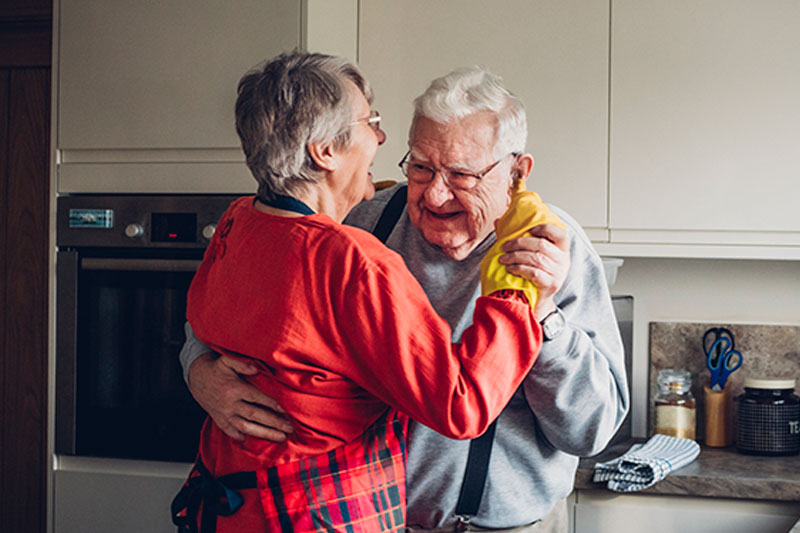
Exercise is beneficial for us all, including those with dementia.
When an older adult has Alzheimer’s disease and all of the challenges that it involves, family care providers need a toolbox chock-full of helpful strategies. Of all the creative techniques care providers can use to aid in making life as safe, comfortable, and meaningful as possible, there is one very effective strategy that could be forgotten: exercise.
We know that exercising is essential for all of us, both physically and mentally, and that does not change with a dementia diagnosis. Exercise often helps:
- Improve sleep
- Strengthen muscles and increase flexibility, balance, and circulation
- Decrease pain
- Lower the risk of falling
- Boost mood and outlook
- And more
Even better, it is drug-free, so there are no unintended side-effects to be concerned about!
To motivate and encourage an older adult with dementia to engage in exercising, plan to exercise together. This makes it possible to model the movements and help the senior when necessary – keeping in mind that doing the exercises as independently as possible is a wonderful way to improve self-esteem and confidence.
Unclear how to begin? Take a few tips from our experts in home care in Stevenson and surrounding communities. Try out these exercises, according to the senior’s ability level.
Exercises for Early and Mid-Stage Dementia
These more advanced exercises work very well for someone with minimal cognitive impairment:
- Sign up (together!) for an exercise class at a local senior center, YMCA, or gym. If the individual likes being in the pool or may benefit from a low impact workout, try water aerobics.
- Dance! You can dance together at home, sign up for a dance class, or bring the older adult to social events at your local senior center that include dancing. Bonus: music is remarkably helpful in rousing memory for older adults with dementia.
- Work together in the garden – pulling weeds, raking, digging, planting, picking vegetables and flowers. Getting out in the fresh air is a good mood booster as well, plus the work provides a fulfilling sense of purpose.
- Clean up! Chores around the house like dusting, vacuuming, sweeping, and even doing laundry are good ways to work in exercise, and doing these jobs together allows for conversations, reminiscing, and a sense of achievement when the work is done.
- Take a walk together – at the park, in a shopping mall, or just around the block. Stick to the same route if the senior prefers, or change it up from day to day if more variety is welcomed.
Exercises for Late-Stage Dementia
Adjustments will need to be made as the disease becomes more advanced, but there are still ways to incorporate physical activity into the senior’s day, such as:
- Sit to stand: From a seated position, with as much support and assistance as needed, the individual will rise up to a standing position, pause for a few seconds, and go back to a seated position. Repeat several times.
- Chair stretches: This video offers a variety of stretches which will help strengthen and build muscles throughout the body.
- Bed stretches: For a senior who is bed-bound, moving and bending the legs and arms, whether independently or with assistance, will help relieve stiff muscles.
Contact Home With You Senior Care’s experts in home care in Stevenson, MD and the nearby areas for help with implementing an appropriate (doctor-approved) fitness regimen for a loved one with dementia, along with the friendly companionship that makes exercise more pleasurable! Reach us any time at 410-756-0959.
